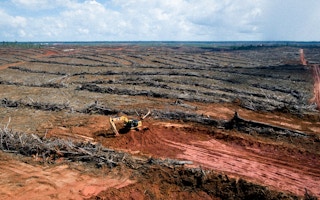Korindo, one of the biggest palm oil companies operating in the Indonesian province of Papua, must “secure remedy” for the damage it has done there or else face expulsion from the Forest Stewardship Council, one of the world’s most influential sustainable forestry certification bodies, the FSC announced this week.
The announcement followed a two-year investigation by the FSC which found that Korindo had violated the certification body’s policies by clearing valuable tracts of rainforest in Papua and failing to properly consult local communities about its plans to convert their land into oil palm.
“Korindo is required to continue its suspension of any forest conversion and deforestation, achieve FSC certification in all its forestry operations and to comply with the principle of FPIC [Free Prior and Informed Consent],” the FSC said in a statement. “Korindo is also required to assess past negative impact and secure remedy for it.”
The precise conditions for Korindo to retain its FSC membership were not elaborated on. But the company appears to be on thin ice. The FSC said it would “closely monitor Korindo’s progress of the measures and conditions stipulated by FSC. Failure to satisfactorily meet these conditions would be the basis for FSC to end its association with the company.”
Mighty Earth, a campaign group that has highlighted Korindo’s practices in Papua, said the company should “return customary lands, resolve social conflicts and grievances, fairly compensate local communities for lost land, natural resources, and livelihoods, and restore damaged ecosystems. Korindo needs to finance the restoration of an area at least equivalent to that which it has destroyed over the past two decades.”
“If Korindo delivers on what must be a commitment running into the hundreds of millions of dollars of liabilities, the FSC’s actions today will set a strong precedent. Today’s announcement has put other companies, like Korindo’s neighbor in Papua, Posco International, on notice that rampant deforestation and destruction of indigenous lands must be eliminated and remedied.”
This story was published with permission from Mongabay.com








